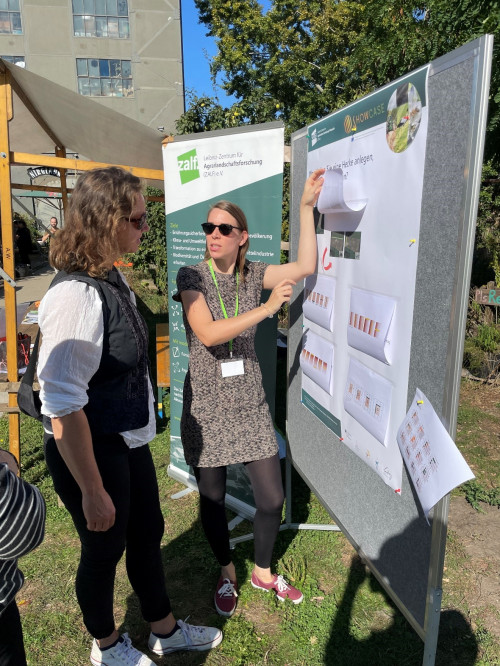SHOWCASE took part in the AgriKultur Festival held in Berlin on 20-21 September, an event designed to bring together individuals and organisations dedicated to transforming the agri-food system, where about 500 participants attended from numerous fields, such as the general public, practitioners, etc. This festival served as a dynamic meeting place for farmers, policymakers, researchers and enthusiasts alike, providing a platform for exchanging ideas, sharing knowledge, and fostering collaborations focused on sustainable agricultural practices.
The event featured a rich program that included panels, presentations and hands-on workshops, all aimed at addressing the pressing issues related to the agri-food system. In addition to scheduled activities, attendees could engage with a farmers’ and information market, showcasing local produce, agricultural innovations and cultural activities that celebrate the relationship between food production and community well-being. The festival gained additional significance through its patronage by Clara Herrmann, the Mayor of Friedrichshain, who underscored the importance of local engagement in agricultural reform.
Among the notable contributions to the festival was Kati Häfner from the Leibniz Centre for Agricultural Landscape Research (ZALF), who presented SHOWCASE findings from a recent farmer survey using an interactive poster format. This innovative approach allowed participants to engage more directly with the data, providing an opportunity for dialogue about the practical considerations of biodiversity conservation on farmland.
During her presentation, Häfner facilitated discussions with festival-goers regarding the strategic planting of hedges to support biodiversity. Participants were encouraged to share their ideas about optimal locations for hedgerows, while also considering the perspectives of farmers in these decisions. This interactive exchange emphasised the importance of habitat connectivity in enhancing biodiversity, as hedges can serve as critical corridors for wildlife, facilitating movement between fragmented habitats.

Image: Participants of the AgriKultur Festival Berlin discussing aspects of farmers’ spatial decision-making
The discussion also touched on several important agronomic considerations, including the need for adequate space for turning farming machinery, commonly referred to as headlands, which can impact overall farmland layout and productivity. Additionally, participants explored how maintaining healthy soil quality can mitigate yield loss, particularly in the context of varying agricultural practices. The role of hedgerows as windbreaks was highlighted as a key factor in preventing soil erosion, thus protecting agricultural land and enhancing its productive capacity.
Overall, the AgriKultur Festival provided a vibrant and enriching environment for sharing knowledge and fostering community engagement around sustainable agricultural practices. SHOWCASE’s involvement not only highlighted important research findings but also underscored the collective effort needed to reshape the agri-food system into one that prioritises biodiversity, sustainability and resilience. Through events like this, the dialogue between researchers, farmers, and the community can lead to more informed and effective strategies for agricultural transformation.
Image: Kati Häfner of SHOWCASE discussing aspects of farmers’ spatial decision-making with a participant at the AgriKultur Festival Berlin.
